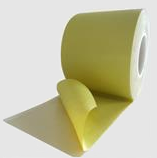GCT5SD | 5-mil Glass Cloth Tape with Silicone Adhesive | Double Sided
Harmonization Code : 7019.59.00.90 | Glass fibres (including glass wool) and articles thereof (for example, yarn, woven fabrics) : Other woven fabrics : Other : Other
Main features
- 5-mil Glass Cloth Tape with Silicone Adhesive
- Double-Sided
- Good Chemical Resistance
Product Description
LINQTAPE GCT5SD-Series Glass Cloth Tape has a high strength glass cloth backing and heat resistant adhesive for high-temperature applications. It resists edge fraying and rotting, as well as solvents and abrasions.
It is flexible and varnish absorbent making it ideal for applications such as high-temperature coil insulation wrap, harness wrapping, and masking splicing.
Applications:
- Powder coating
- Paint Masking
Technical Specifications
| General Properties | |
| Adhesive Layer Adhesive Layer A layer that is applied to one surface or both to bind items together and resist their separation | Silicone |
| Adhesive Thickness Adhesive Thickness Adhesive thickness indicates the thickness of an adhesive layer. It refers to the adhesive thickness of a single side so for double sided tapes it always needs to be multiplied. | 101.6 µm |
| Chemistry Type | Glass Cloth |
| Color Color The color | White |
| Film Thickness Film Thickness Film thickness is the thickness of a backing film without taking into account any coatings or adhesive layers. It is measured in micron and the conversion factor to mil is 0.039. | 127 µm |
| Release Liner Release Liner A paper or plastic-based film sheet used to prevent a sticky surface from prematurely adhering | Yes |
| Single or Double-Sided Adhesive Single or Double-Sided Adhesive Describes whether a tape is single- or double-sided. If it is single-sided, it has adhesive only on one side of the backing film. If it is double-sided, then it has adhesive on both sides of the backing film. | Double-Sided |
| Total Thickness Total Thickness Total thickness is taking into account all the films, coatings, adhesives, release liners and special layers and is the maximum thickness of a film or tape. | 228.6 μm |
| Mechanical Properties | |
| Adhesion Strength Adhesion Strength Adhesion is the bond strength measurement of a coating to a substrate. When an adhesive is bonded to an item or surface, numerous physical, mechanical and chemical forces come into play, which may have an effect on each other. | 21.2 Oz/in |
| Elongation Elongation Elongation is the process of lengthening something. It is a percentage that measures the initial, unstressed, length compared to the length of the material right before it breaks. It is commonly referred to as Ultimate Elongation or Tensile Elongation at break. | 5 % |
| Tensile Strength (Thin Film) Tensile Strength (Thin Film) Tensile strength determines the resistance of a material to break under tension and it measures how much elongating load (or tensile stress) it can handle before fracture. To make it simple, it measures how much force we have to apply when pulling apart a material before it breaks. | 320 N/cm |
| Thermal Properties | |
| Temperature Resistance Temperature Resistance Temperature resistance is the maximum temperature that the material or product can withstand for a period of time. The temperatures listed should be considered as guidelines for an operating temperature of about 30 minutes. Typically, the material can withstand much longer times at temperatures about 20°C lower and can withstand much higher temperatures for short, intermittent times. | 260 ˚C |
| Other Properties | |
| RoHS Compliant RoHS Compliant RoHS is a product level compliance based on a European Union Directive which restricts the Use of certain Hazardous Substances in Electrical and Electronic Equipment (RoHS). Products compliant with this directive do not exceed the allowable amounts of the following restricted materials: lead, mercury, cadmium, hexavalent chromium, polybrominated biphenyls (PBB) and polybrominated diphenyl ethers (PBDE), with some limited exemptions | Yes |
| VOC-Free (100% solids content) VOC-Free (100% solids content) VOC means Volatile Organic compound. VOCs are evaporating molecules and are literally everywhere around us. Our scents are volatile organic compounds, most of the things that we smell are VOC etc. So what do we mean when we state that a product is VOC free? A VOC free product, according to the FTC is one where: 1)VOCs have not been intentionally added to the product. 2)The presence of VOCs at that level does not cause material harm that consumers typically associate with VOCs, including but not limited to, harm to the environment or human health. 3)The presence of VOCs at that level does not result in concentrations higher than would be found at background levels in the ambient air. | Yes |




